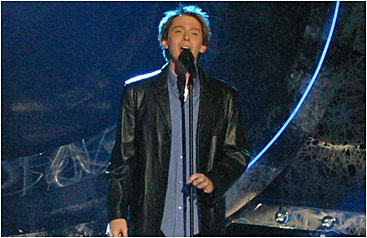Last night, ABC's Primetime Live aired its potentially explosive (and much hyped) "exposé" of the Fox reality-competition smash American Idol. After all was said and done, though, the "exposé" seemed like little more than titillating gossip dressed up with lots of smoke and mirrors, in the hopes of crippling a rival network's most important show.
|
ADVERTISEMENT
|
Although much of the show was devoted to an attempt to "prove" the personal relationship between Corey and Paula, these charges have little "scandal-mongering" value. After all, the Idol judges do not take vows of chastity as part of their jobs. There is also no aura of sexual harrassment by a powerful superior, since the judges are little more than high-priced window dressing after choosing the semifinalists. It was the voting TV viewers, not the judges, that advanced Corey from the semifinals into the finals and then kept him on the show for three weeks.
In addition, the "inappropriatenesss" once associated with a relationship between a younger man and an older woman (as here, since Paula is 18 years older than Corey) has largely vanished in recent years. For example, Paula is the same age as Demi Moore (both were born in 1962), and Corey is just a couple of years younger than Demi's boyfriend (and rumored father-to-be) Ashton Kutcher. Paula didn't even have to embrace the hot Hollywood "cult" of Kabbalah to meet her boytoy.
Thus, while Corey's allegations of a sexual relationship with Paula seem relatively credible (even considering his record for dishonesty), the idea that she provided "service with a smile" to Corey during the Idol 2 semifinals and finals doesn't have any scandal associated with it, despite ABC's breathless attempts to pretend otherwise -- and an exposé MUST have some scandal, or else it's merely hype.
Thus, Primetime Live rested its claims of scandal on Corey's allegation that he received help from Paula in the areas of song selection and on-stage look. In that sense, there was one claim made by Corey worth investigating: his charge that Paula picked the song that he sang in the semifinals -- "Foolish Heart," a hit for Journey lead singer Steve Perry, which featured bass and production contributions from American Idol judge (and Journey bassist on the Raised on Radio album and tour) Randy Jackson.
The program claimed that the choice of song was designed by Paula to elicit praise from Randy for Corey and to position Corey as a possible "wild-card" finalist in the event that Corey failed to qualify through viewer voting. If this theory were true, the effort proved unnecessary when Corey became one of the two finalists chosen by the viewers from the semifinal group -- which relates more to his performance of the song rather than the choice of song itself.
Nevertheless, if Paula deliberately chose the song for Corey because of Randy's association with it (as Corey alleges), it seems like a "high-risk" strategy instead of the "sure thing" that ABC indicated. Randy would be intimately aware of any weaknesses in Corey's vocal performance. If Corey failed to live up to Steve Perry's version -- if, in short, he came off like one of the "karaoke singers" about whom Randy and third judge Simon Cowell complain on a regular basis -- it seems likely that Randy would have been even harsher on Corey because of his familiarity with the song. The choice of song paid off only because Corey managed to nail it, in Randy's opinion -- and that depended solely on Corey, not on Paula.
The ABC report then featured complaints by several unsuccesful semifinalists that they should have received similar help from a judge. However, since the Idol contestants are not sequestered inside a house 24/7 (as with, say, Big Brother), it seems likely that the semifinalists received help and advice from family members, personal managers, significant others, etc. Ultimately, no amount of coaching or complaining can change the fact that it wasn't Paula Abdul who performed the song in the semifinals -- or that the only way tenth place finisher Julia DeMato (who recently told the New York Times that she felt that Clay Aiken and Ruben Studdard received more coaching than other Idol 2 finalists) could have finished in the top three was if Clay, Ruben, Kimberley Locke, Josh Gracin and Trenyce all simultaneously developed long-lasting cases of laryngitis.
In addition, praise for Corey from Paula (the "cheerleader judge" who says nice things about almost every performance) doesn't count for much. Paula even praised Idol 4 finalist Anthony Fedorov's pathetic stab at the 1950s rock classic 'Poison Ivy' this week, illustaring her continuing inability (or unwillingness) to differentiate good performances from bad. Considering her public comments about some of the worst performances ever seen in the finals, whether her coaching would actually prove more beneficial than the coaching given to all the Idol finalists is at best an open question.
Unlike the charges of a Corey-Paula affair, this part of ABC's report -- the heart of its charges of scandal -- was based solely on Corey's unsupported word. ABC apparently believed that Corey's evidence about the affair was sufficient to support his word about these less-probable charges of impropriety -- even though, considering Corey's past record and the fact that these charges were essential to ABC's effort to upgrade tacky gossip into a 'scandal', Corey's most serious charges should have been viewed as the most suspect. It remains to be seen what action (if any) Paula's pit-bull lawyer Martin Singer will take with respect to ABC.
As far as Paula's help with wardrobe and presentation, Paula isn't exactly known for her excellent taste in clothing, especially since she goes out in public dressed like this. It is difficult to see how her "fashion tips" would be more valuable than the help already being provided to Idol contestants by consultants from producer 19 Entertainment, which produced this transformation in Idol 2 runner-up Clay Aiken between audition and finale:
  |
For Corey's part, there seem to be two main incentives for his "confessions": (1) sour grapes from a guy who got a taste of how well stars like Paula live, only to have it abruptly yanked away from him, and (2) free promotion for his new "tell-all" song 'Paula-tics' (which was played frequently during the show), for his upcoming album (which, judging by 'Paula-tics', would probably sink without a trace without this publicity), and his 'tell-all' book They Told Me to Tell the Truth, So ... (The Sex, Lies, and Paula-tics of One of America's Idols) (which is now available as an e-book). For ABC's part, there seemed only one incentive: to trash a key show on a rival channel. Perhaps Corey and ABC deserve each other.
Although the story ultimately did not implicate American Idol in any form of misconduct, it does present a threat to Paula Abdul, by making producers aware of her poor judgment -- though her rambling comments as a judge should have done that already. Bad publicity has a way of adding up, and Paula Abdul has already received more than her share this year.
Paula was involved in a hit-and-run accident and pled to a misdemeanor as a result. Several allegations of drug abuse also were made against her, leading to her public claim that the only medicine she takes is for an old back injury.
More 'scandal', no matter how overheated from reality, won't help her image with viewers one bit -- and some viewers had already been calling for her replacement even before these new allegations. On the other hand, Paula doesn't have much credibility at risk from the exposé, because her role as the "positive" judge who always praises the contestants doesn't leave her with much credibility.
Fox and Idol producers 19 Entertainment and FremantleMedia issued a statement today that they "take any accusations of this nature very seriously, no matter their source, and [they] have already begun looking into them." Despite this statement, it seems unlikely that Idol will mess with its winning formula by canning Paula unless either some real evidence of manipulation on her part turns up or the public turns on her.
No such evidence will come from Corey Clark. As the statement notes, "Despite documented procedures and multiple opportunities, as well as contractual requirements for contestants to raise any concerns, we were never notified or contacted by Mr. Clark or any other individual, nor presented any evidence concerning these claims. Upon recently hearing rumors of Mr. Clark’s claims, we contacted him and requested that he detail his accusations to us. That has yet to happen."
In fact, Corey whined to ABC's Good Morning America that "I don't have any interest in helping American Idol out whatsoever, because they haven't helped me out whatsoever. They made it very hard for me to do what I'm doing, which is my career." So much for Corey's claim in his book title that all he wants to do is tell the truth....
Will Paula remain on Idol despite these charges? It appears that no decision has been made at this time. However, if Paris Hilton can maintain her popularity despite the release of several sex tapes and allegations of racist and anti-Semitic behavior, then it seems entirely possible that all the exposé will do is boost Paula's lawyers' bills ... oh, and damage Primetime Live's credibility, after it failed to deliver anything that was "potentially explosive" about American Idol.




